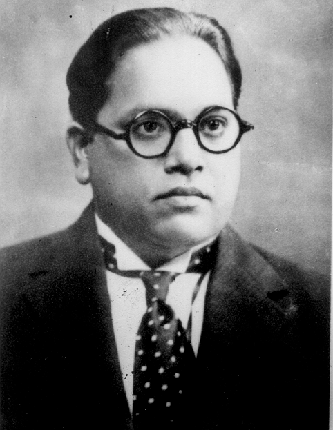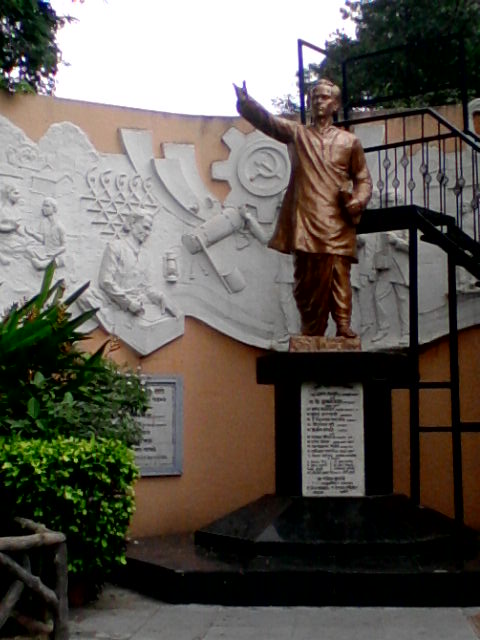|
Annabhau Sathe
Tukaram Bhaurao Sathe (1 August 1920 ‚Äď 18 July 1969), popularly known as Anna Bhau Sathe (Marathi pronunciation: ô…≥ňźaňźb Īaňźu saňź ą įe, was a social reformer, folk poet, and writer from Maharashtra, India. Sathe was a Dalit born into the untouchable community, and his upbringing and identity were central to his writing and political activism. Sathe was a Marxist-Ambedkarite mosaic, initially influenced by the communists but he later became an Ambedkarite. He is credited as a founding father of ' Dalit Literature' and played vital role in Samyukta Maharashtra Movement. Early life He was born on 1 August 1920, in Wategaon village, part of present-day Maharashtra's Sangli district, to a family that belonged to the untouchable Matang caste. Members of the caste used to play traditional folk instruments in Tamasha performances. Annabhau Sathe did not study beyond class four. He migrated from Satara to Bombay, present-day Mumbai, in 1931, on foot, over a period of ... [...More Info...] [...Related Items...] OR: [Wikipedia] [Google] [Baidu] |
India
India, officially the Republic of India (Hindi: ), is a country in South Asia. It is the seventh-largest country by area, the second-most populous country, and the most populous democracy in the world. Bounded by the Indian Ocean on the south, the Arabian Sea on the southwest, and the Bay of Bengal on the southeast, it shares land borders with Pakistan to the west; China, Nepal, and Bhutan to the north; and Bangladesh and Myanmar to the east. In the Indian Ocean, India is in the vicinity of Sri Lanka and the Maldives; its Andaman and Nicobar Islands share a maritime border with Thailand, Myanmar, and Indonesia. Modern humans arrived on the Indian subcontinent from Africa no later than 55,000 years ago., "Y-Chromosome and Mt-DNA data support the colonization of South Asia by modern humans originating in Africa. ... Coalescence dates for most non-European populations average to between 73‚Äď55 ka.", "Modern human beings‚ÄĒ''Homo sapiens''‚ÄĒoriginated in Africa. Then, int ... [...More Info...] [...Related Items...] OR: [Wikipedia] [Google] [Baidu] |
Powada
The powada ( mr, ŗ§™ŗ•čŗ§Ķŗ§ĺŗ§°ŗ§ĺ) is a genre of Marathi poetry that was during the late 17th century in India. Powada, which means ‚Äėto glorify‚Äô, is a traditional Marathi ballad that traces its history to more than 750 years Powadas often glorified and celebrated deeds of popular folk figures and leaders such as Chhatrapati Shivaji and Tanaji Malusare, and were also written to raise awareness on social issues such as female foeticide, dowry and corruption. Powadas were also used as a medium to create an awareness during Samyukta Maharashtra movement. Powada is also a genre of poetry popular in Uttarakhand, specifically that glorifies warriors. It is popular in Kumaun as well as Garhwal regions of the state and is sung, performed or narrated on various occasions. It is also known as "Bhada" Details The composer-cum-singers of the powadas are known as ''Shahir''s. The professional powada singers formed a guild or caste known as the ''Gondhali''s. The earliest notable powada w ... [...More Info...] [...Related Items...] OR: [Wikipedia] [Google] [Baidu] |
Shiv Sena
Shiv Sena ( IAST: ''Ňöiva SńďnńĀ'') () was a right-wing to far-right Marathi regionalist and Hindu ultranationalist political party in India founded in 1966 by cartoonist Bal Thackeray. Originally emerging from nativist movements in Bombay (present-day Mumbai), the party agitated for preferential treatment for the Marathi people over migrants from other parts of India. Its election symbol for Maharashtra was the ''Bow and Arrow''. Although the party's primary base always remained in Maharashtra, it tried to expand to a pan-Indian base. In the 1970s, it gradually moved from advocating a pro-Marathi ideology to one supporting a broader Hindu nationalist agenda, and aligned itself with the Bharatiya Janata Party (BJP). The party took part in Mumbai ( BMC) municipal elections for its entire existence. In 1989, it entered into an alliance with the BJP for Lok Sabha as well as Maharashtra Legislative Assembly elections. The alliance in the latter was temporarily broken in the ... [...More Info...] [...Related Items...] OR: [Wikipedia] [Google] [Baidu] |
Bharatiya Janata Party
The Bharatiya Janata Party (BJP; ; ) is a political party in India, and one of the two major Indian political parties alongside the Indian National Congress. Since 2014, it has been the ruling political party in India under Narendra Modi, the incumbent Indian prime minister. The BJP is aligned with right-wing politics, and its policies have historically reflected a traditional Hindu nationalist ideology; it has close ideological and organisational links to the Rashtriya Swayamsevak Sangh (RSS). , it is the country's largest political party in terms of representation in the Parliament of India as well as state legislatures. The party's origins lie in the Bharatiya Jana Sangh, which was founded in 1951 by Indian politician Shyama Prasad Mukherjee. After The Emergency of 1975‚Äď1977, the Jana Sangh merged with several other political parties to form the Janata Party; it defeated the then-incumbent Indian National Congress in the 1977 general election. After three years in ... [...More Info...] [...Related Items...] OR: [Wikipedia] [Google] [Baidu] |
Indian National Congress
The Indian National Congress (INC), colloquially the Congress Party but often simply the Congress, is a political party in India with widespread roots. Founded in 1885, it was the first modern nationalist movement to emerge in the British Empire in Asia and Africa. From the late 19th century, and especially after 1920, under the leadership of Mahatma Gandhi, the Congress became the principal leader of the Indian independence movement. The Congress led India to independence from the United Kingdom, and significantly influenced other anti-colonial nationalist movements in the British Empire. Congress is one of the two major political parties in India, along with its main rival the Bharatiya Janata Party. It is a "big tent" party whose platform is generally considered to lie in the centre to of Indian politics. After Indian independence in 1947, Congress emerged as a catch-all and secular party, dominating Indian politics for the next 20 years. The party's first prime minister ... [...More Info...] [...Related Items...] OR: [Wikipedia] [Google] [Baidu] |
Savitribai Phule
Savitribai Phule was an Indian social reformer, educationalist, and poet from Maharashtra. Along with her husband, in Maharashtra, she played an important and vital role in improving women's rights in India. She is considered to be the pioneer of India's feminist movement. Savitribai and her husband founded one of the first modern Indian girls' school in Pune, at Bhide wada in 1848. She worked to abolish the discrimination and unfair treatment of people based on caste and gender. Early life Savitribai Phule was born on 3 January 1831 in the village of Naigaon in Satara District, Maharashtra. Her birthplace was about from Shirval and about from Pune. Savitribai Phule was the youngest daughter of Lakshmi and Khandoji Nevase Patil, both of whom belonged to the Mali Community. She had three siblings. Savitribai was married to her husband Jyotirao Phule at the age of 9 or 10 (he was 13). Savitribai and Jyotirao had no children of their own. It is said that they adopted Yash ... [...More Info...] [...Related Items...] OR: [Wikipedia] [Google] [Baidu] |
Babasaheb Ambedkar
Bhimrao Ramji Ambedkar (14 April 1891 ‚Äď 6 December 1956) was an Indian jurist, economist, social reformer and political leader who headed the committee drafting the Constitution of India from the Constituent Assembly debates, served as Law and Justice minister in the first cabinet of Jawaharlal Nehru, and inspired the Dalit Buddhist movement after renouncing Hinduism. Ambedkar graduated from Elphinstone College, University of Bombay, and studied economics at Columbia University and the London School of Economics, receiving doctorates in 1927 and 1923 respectively and was among a handful of Indian students to have done so at either institution in the 1920s. He also trained in the law at Gray's Inn, London. In his early career, he was an economist, professor, and lawyer. His later life was marked by his political activities; he became involved in campaigning and negotiations for India's independence, publishing journals, advocating political rights and social freedo ... [...More Info...] [...Related Items...] OR: [Wikipedia] [Google] [Baidu] |
Anna Bhau Sathe
Tukaram Bhaurao Sathe (1 August 1920 ‚Äď 18 July 1969), popularly known as Anna Bhau Sathe (Marathi pronunciation: ô…≥ňźaňźb Īaňźu saňź ą įe, was a social reformer, folk poet, and writer from Maharashtra, India. Sathe was a Dalit born into the untouchable community, and his upbringing and identity were central to his writing and political activism. Sathe was a Marxist-Ambedkarite mosaic, initially influenced by the communists but he later became an Ambedkarite. He is credited as a founding father of ' Dalit Literature' and played vital role in Samyukta Maharashtra Movement. Early life He was born on 1 August 1920, in Wategaon village, part of present-day Maharashtra's Sangli district, to a family that belonged to the untouchable Matang caste. Members of the caste used to play traditional folk instruments in Tamasha performances. Annabhau Sathe did not study beyond class four. He migrated from Satara to Bombay, present-day Mumbai, in 1931, on foot, over a period o ... [...More Info...] [...Related Items...] OR: [Wikipedia] [Google] [Baidu] |
Bombay State
Bombay State was a large Indian state created at the time of India's Independence, with other regions being added to it in the succeeding years. Bombay Presidency (roughly equating to the present-day Indian state of Maharashtra, excluding South Maharashtra and Vidarbha) was merged with the princely states of Baroda, Western India and Gujarat (the present-day Indian state of Gujarat) and the Deccan States (which included parts of the present-day Indian states of Maharashtra and Karnataka). On 1 November 1956, Bombay State was re-organized under the States Reorganisation Act on linguistic lines, absorbing various territories including the Saurashtra and Kutch States, which ceased to exist. On 1 May 1960, Bombay State was dissolved and split on linguistic lines into the two states of Gujarat, with Gujarati speaking population and Maharashtra, with Marathi speaking population. History During the British Raj, portions of the western coast of India under direct British rule ... [...More Info...] [...Related Items...] OR: [Wikipedia] [Google] [Baidu] |
Indian People's Theatre Association
Indian People's Theatre Association (IPTA) is the oldest association of theatre-artists in India. IPTA was formed in 1943 during the British rule in India, and promoted themes related to the Indian freedom struggle. Its goal was to bring cultural awakening among the people of India. Beginning The Bangalore unit of IPTA was formed in 1941. IPTA was formed on 25 May 1943 at the National conference of theater artists held at the Marwari school, Bombay in response to the need for theater artists to become part of the Indian freedom struggle. Its origins lay in the first Progressive Writer's Association Conference that was held in 1936, the establishment of the Youth Cultural Institute at Calcutta in 1940, and the setting up of the People's Theatre in Bangalore by Anil De’ Silva in 1941. Its initial members consisted of various progressive cultural troupes, theatre groups and other progressive cultural activists. The name People's Theatre was suggested by the renowned scientist Ho ... [...More Info...] [...Related Items...] OR: [Wikipedia] [Google] [Baidu] |






